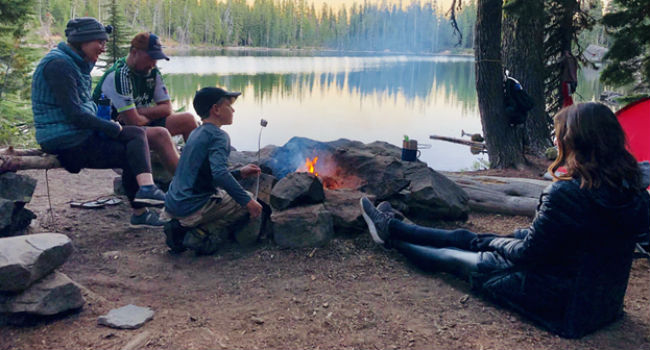From playing games around the campfire to losing ourselves under the star-filled sky to hiking on those rocky trails, camping is full-on fun and chill-inducing. However, like any other travelling venture, forest camping also has its unique prerequisites.
Camping demands a considerable sense of awareness of surroundings and consciousness of danger in the wilds. Camping needs vigilance and a proactive approach at every step, from placing the insulated dome on the right site and food preventing to dealing with an unfortunate confrontation with those grizzly bears.
We need to keep in mind seven essential things before we head out on a forest camping:
1. Do plan and research ahead
Researching the weather of the destination well in advance helps immensely. This helps in packing the camping gear efficiently. Understand the wildlife of the place and prepare accordingly with safety tips and medicines. Bears, snakes, or chimps look innocuous in a zoo, but they can land us into trouble when confronted unexpectedly.
Gather the information about the campsite from the camp rangers. They are the best people to inform us about the directives regarding campfire, wildlife, waste management, and restricted areas.
2. Be prepared for medical & health issues
Be fully equipped with all the essential medical gear, even when indulging in glamping luxuries. If traveling with elders or persons with existing medical conditions, take extra precautions and carry their prescriptions—this can be crucial in case medications are lost.
Make a note of allergies, doctor’s phone numbers, names of medicines, and keep the list handy. Even in a glamping setup with premium amenities, health risks remain, especially in a forest setting. Vaccinations can protect against potential hazards; a quick consultation with a doctor before camping can be beneficial. Ensure you are vaccinated for tetanus, hepatitis A, meningitis, or any required allergy shots. If bringing pets, make sure they have received all necessary vaccinations as well.

3. Set the campfire safely
Some campgrounds provide fire pits for building campfires, but if you’re heading to a remote area, you may need to bring your own. A good option is a portable fire pit with propane, which is clean-burning, safe, and eliminates the hassle of building one from scratch. However, even with this option, it’s crucial to follow a few safety measures. Some of these are outlined below.
- Always choose a spot 15 feet away from the tent, trees, and shrubs.
- Do not light the campfire below the long dangling branches.
- Do not bring logs and branches from other places, which may get some infectious diseases from that place.
- If you have pets and children, keep them away from the fire as much as possible.
The campfire should always be under supervision. Before going to sleep, ensure that the fire is safe and keep away any fire items. Always make sure to keep a bucket of water ready near the campfire.
4. Arrange for food and cooking equipment
Some designated campgrounds provide the facilities of electricity, gas, and other cooking equipment. But, if you are heading to a campsite that does not offer glamping luxuries, you must bring the cooking equipment. Check if there is any possibility of a local shop near the campsite where food items and cooking equipment are available. If you get along gas stoves, ensure there is enough gas that lasts for our trip.
Research ahead about food materials and smells that might attract the attention of wild animals. To avoid this, store food in waterproof bags and preserve them in an insulated cooler. Wash hands repeatedly and keeps cooked meals away from raw food to prevent air-borne diseases.
Many campers find it easier to choose a site that already offers secure food storage and basic cooking facilities to reduce the chance of attracting wildlife and to simplify meal prep. If you are heading to southern England, a concise list of managed campsites can help you compare on-site facilities, dog-friendly rules and proximity to local shops or trails. For practical campsite options in Hampshire and notes on facilities and pet policies, see Camping New Forest. Picking a well-sited campground like these will let you focus more on safety and enjoying the outdoors.
5. Plan for a relaxing sleep
For a nice sleep while camping, bring a comfortable sleeping bag, a cushion, and a pillow. Sleeping pads make sleeping more enjoyable. Also, get repair kits to repair any leakage in the air mattress. Carry heavy-duty plastic bags instead of the pillows for pleasant sleep.
Since the weather condition of the campsite is a big concern, choose the type of tent accordingly. Light three season tents can guard you in summer, winter, and spring. Mountaineering tents are specially designed for extreme weather conditions, especially winters.
6. Dealing with insects
Chances of exposure to insects, mosquitoes, and flies are relatively high in the wild. Carry insect repellents to ensure prevention from getting bitten or infected by them. Visit this website for more information.
- Always prefer long shirts and long pants to prevent exposure to insects while hiking.
- Spray natural repellents on clothes to kill ticks and other insects.
- White vinegar and apple cider vinegar have a sharp pungent smell that keeps the insects and mosquitos away.
- Citronella tea lights are also good insect repellents.
7. Packing First aid kit
Cuts, wounds, and minor injuries may happen anytime while walking in the forests. In such situations, first aid survival kits become the need of the hour.
First aid kits should carry bandages and antiseptics for small wounds and insect bites.
- Sterile gauze pads and gauge rolls are useful for dressing wounds, burns, and scrapes.
- Epipen can be useful for people who suffer from severe allergies.
- Carry Aspirin or Paracetamol to treat headaches.
- Hydrogen Peroxide solutions help to treat wounds and for rinsing mouths.
- Tweezers help pluck small thorns from our skin.
Eye drops, a thermometer, burn ointment, and a pair of scissors are essentials of our survival kit.
Conclusion
Camping makes a beautiful getaway from the routine monotonous life. With little precaution and planning, camping can be enjoyable and safe. It is also equally essential for us to leave footprints, but not leftovers while camping. That is the least we could do to protect our Mother Earth.


























































